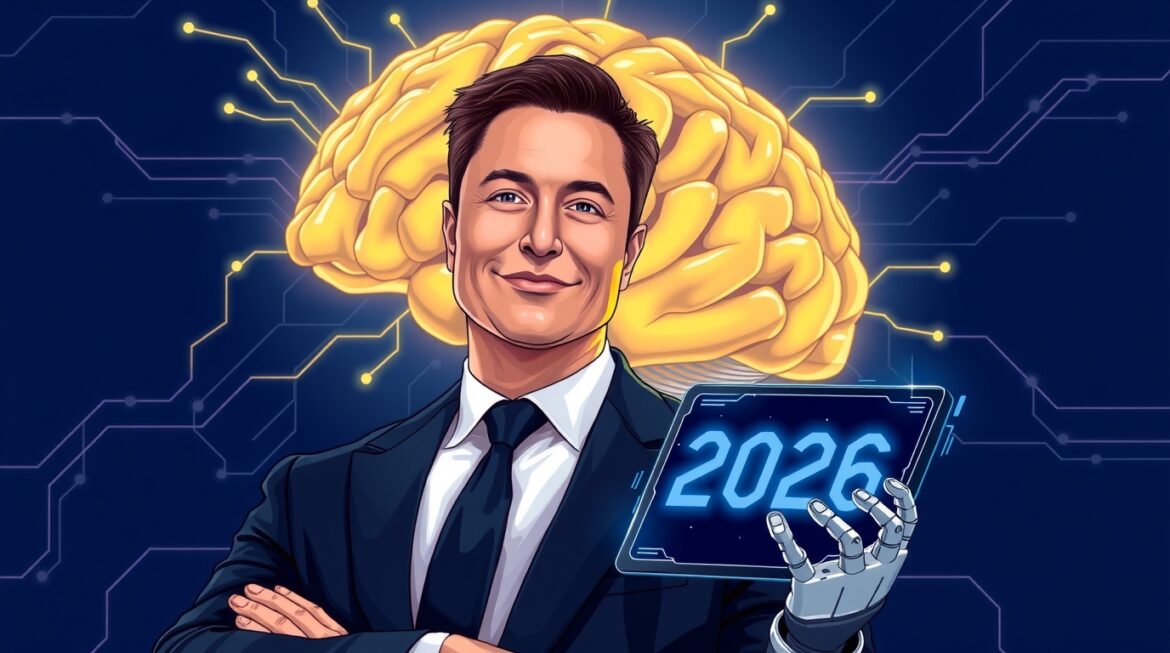Elon Musk’s 2026 AI Prediction: How Artificial Intelligence Could Surpass Human Intelligence
In a bold statement that has sent ripples through the tech community, Elon Musk – the billionaire entrepreneur and CEO of SpaceX and Tesla – has predicted that artificial intelligence (AI) will surpass human intelligence by 2026. This vision, one that has captured the attention of tech enthusiasts and skeptics alike, raises fundamental questions about the future of AI, its potential impact on society, and the ethical challenges that come with it.
A Groundbreaking Prediction
Musk, known for his forward-thinking and often controversial opinions on technology, made the prediction during a recent interview on a popular technology podcast. While speaking about the rapid advancements in AI, Musk suggested that within the next three years, machines could achieve and exceed the cognitive capabilities of the human brain.
His prediction has generated mixed reactions, with some experts agreeing that AI is progressing at an unprecedented pace, while others remain cautious about such a swift timeline. “AI development is accelerating, and while there are still many hurdles to overcome, it’s not entirely out of the realm of possibility that we could see human-level intelligence in machines sooner than expected,” Musk stated.
The Race to Achieve AGI
Musk’s prediction revolves around the concept of Artificial General Intelligence (AGI), a form of AI that possesses the ability to perform any intellectual task that a human can do. Unlike narrow AI, which is designed for specific tasks (like language translation or image recognition), AGI would have the capacity for reasoning, problem-solving, and creativity across a broad range of domains.
Currently, most AI systems are limited to specific tasks. However, recent breakthroughs in machine learning, deep learning, and neural networks have sparked optimism about the possibility of creating AGI. Companies like OpenAI, which Musk co-founded, and tech giants like Google, Microsoft, and Amazon are racing to develop more sophisticated AI models that could one day lead to AGI.
The Potential Impact of Superintelligent AI
If Musk’s prediction comes true, the implications for society would be immense. Superintelligent AI could revolutionize industries, from healthcare and education to finance and transportation. Autonomous machines could potentially solve some of humanity’s most pressing problems, such as climate change, poverty, and disease.
However, the rise of superintelligent AI also brings significant risks. Experts have warned about the potential dangers of creating machines that surpass human intelligence, particularly in terms of control and safety. Musk himself has long been an outspoken advocate for AI regulation, arguing that without proper oversight, AI could pose an existential threat to humanity.
In 2014, Musk famously referred to AI as “summoning the demon,” warning that AI could evolve beyond human control and lead to disastrous consequences. He has called for proactive measures to ensure that AI development is aligned with human values and remains safe for society.
The Debate Over AI Regulation
As AI technology continues to advance, the debate over regulation has become more urgent. Some experts, like Musk, advocate for preemptive regulation, suggesting that the government should play a key role in ensuring that AI development is safe and ethical. Others argue that regulation could stifle innovation and slow progress in this rapidly evolving field.
In recent years, several countries have begun to explore the potential for AI regulation. The European Union has proposed legislation aimed at establishing clear guidelines for AI development, while the United States has focused on fostering innovation while encouraging responsible AI research.
Is 2026 Too Soon?
While Musk’s timeline may seem ambitious, it is not entirely without precedent. Technological advancements often occur at a faster pace than anticipated, and AI research has made significant strides in recent years. However, some experts remain skeptical about the prospect of achieving AGI by 2026.
“While the pace of AI development is accelerating, there are still major technical and ethical challenges to overcome before we can create a machine that matches human-level intelligence,” says Dr. Jane Smith, an AI researcher at MIT. “Predicting AGI by 2026 might be overly optimistic, but the progress we’re seeing is certainly impressive.”
Conclusion
As we stand on the brink of a new era in AI, Elon Musk’s prediction about superintelligent machines by 2026 serves as both a warning and a challenge. The promise of AGI offers incredible opportunities for innovation, but it also raises profound questions about the role of AI in our lives and the ethical considerations surrounding its development.
The future of AI is uncertain, but one thing is clear: the race to build machines that rival human intelligence is on, and the coming years will be critical in shaping the path forward. Whether or not Musk’s timeline proves accurate, the journey towards AGI will undoubtedly reshape the technological landscape—and potentially our very understanding of intelligence itself.
Stay tuned as we continue to track the latest developments in artificial intelligence and its impact on society.


